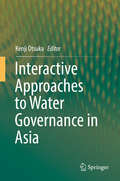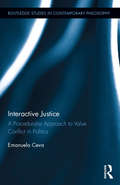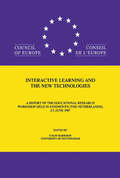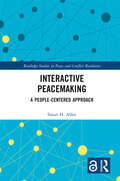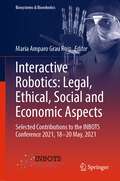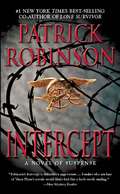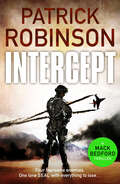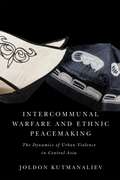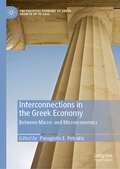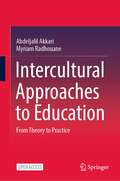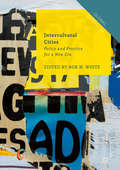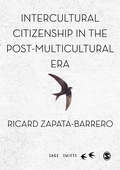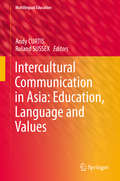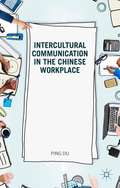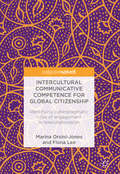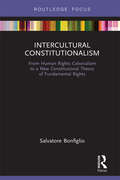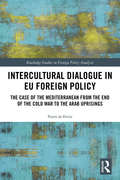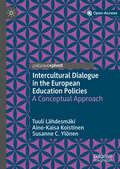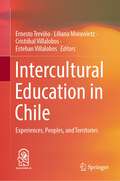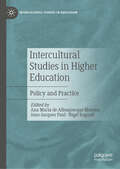- Table View
- List View
Interactive Approaches to Water Governance in Asia
by Kenji OtsukaThis book applies interactive perspectives, which have historically mainly been discussed in the context of Western European countries, to case studies on water governance in Asia. It examines how these perspectives can be used to reveal complex and dynamic interactions in water governance in Asia, and how interactions between policies and practices, as well as those between formal institutes and emerging informal institutes, come to pass. In two introductory chapters and seven case studies in Asia (two from China, and each one from Japan, Thailand, the Philippines, Indonesia, and India), the book reveals the interactive forms currently emerging in Asia under hierarchical but often fragmented administrative systems. In addition, it explores emerging hybrid forms of interactive governance, which bring together governmental and non-governmental actors, and discusses how the expected role of government and roles of non-governmental actors could be changed to solve problems in a more cooperative manner. In this context, researchers from outside the locality could play an important role, helping facilitate such forms of interactive governance. The book offers extensive information on the essential features of interactive forms, and on the role of such transdisciplinary approaches, making it a valuable resource not only for scholars and university students, but also for policymakers and grass-roots practitioners directly involved in the interactive process of water governance.
Interactive Democracy
by Carol C. GouldHow can we confront the problems of diminished democracy, pervasive economic inequality, and persistent global poverty? Is it possible to fulfill the dual aims of deepening democratic participation and achieving economic justice, not only locally but also globally? Carol C. Gould proposes an integrative and interactive approach to the core values of democracy, justice, and human rights, looking beyond traditional politics to the social conditions that would enable us to realize these aims. Her innovative philosophical framework sheds new light on social movements across borders, the prospects for empathy and solidarity with distant others, and the problem of gender inequalities in diverse cultures, and also considers new ways in which democratic deliberation can be enhanced by online networking and extended to the institutions of global governance. Her book will be of great interest to scholars and upper-level students of political philosophy, global justice, social and political science, and gender studies.
Interactive Justice: A Proceduralist Approach to Value Conflict in Politics (Routledge Studies in Contemporary Philosophy)
by Emanuela CevaContemporary societies are riddled with moral disputes caused by conflicts between value claims competing for the regulation of matters of public concern. This familiar state of affairs is relevant for one of the most important debates within liberal political thought: should institutions seek to realize justice or peace? Justice-driven philosophers characterize the normative conditions for the resolution of value conflicts through the establishment of a moral consensus on an order of priority between competing value claims. Peace-driven philosophers have concentrated, perhaps more modestly, on the characterization of the ways in which competing value claims should be balanced, with a view to establishing a modus vivendi aimed at containing the conflict. Interactive Justice addresses an important question related to this debate: on what terms should the parties interact during their conflict for their interaction to be morally acceptable to them? Although largely unexplored by political philosophers, this is a main area of concern in conflict management. Building on a proceduralist interpretation of "relational" concerns of justice, the author develops a liberal normative theory of interactive justice for the management of value conflict in politics grounded in the fundamental values of fair hearing and procedural equality. This book innovatively builds a bridge between works in political philosophy and peace studies to propose a fresh lens through which to view the normative responses liberal institutions ought to give to value conflict in politics, and moves beyond the apparent dichotomy between pursuing end-state justice through conflict resolution or peace through conflict containment.
Interactive Learning & The New
by Colin HarrisonThis book compares research findings on particular topic of interactive learning to identify areas of research, and discusses possibilities of research co-operation. It presents an argument that in the UK the emphasis on small group work using a microcomputer is the result of pedagogical opinion.
Interactive Peacemaking: A People-Centered Approach (Routledge Studies in Peace and Conflict Resolution)
by Susan H. AllenThis book examines the theory and practice of interactive peacemaking, centering the role of people in making peace. The book presents the theory and practice of peacemaking as found in contemporary processes globally. By putting people at the center of the analysis, it outlines the possibilities of peacemaking by and for the people whose lives are touched by ongoing conflicts. While considering examples from around the world, this book specifically focuses on peacemaking in the Georgian-South Ossetian context. It tells the stories of individuals on both sides of the conflict, and explores why people choose to make peace, and how they work within their societies to encourage this. This book emphasizes theory built from practice and offers methodological guidance on learning from practice in the conflict resolution field. This book will be of much interest to students and practitioners of peacemaking, conflict resolution, South Caucasus politics and International Relations.
Interactive Robotics: Selected Contributions to the INBOTS Conference 2021, 18-20 May, 2021 (Biosystems & Biorobotics #30)
by María Amparo Grau RuizThis book reports on cutting-edge legal, ethical, social and economic issues relating to robotics and automation, human-machine interaction and artificial intelligence, in different application areas. It discusses important problems such as robotic taxation, social inequality, protection of neuro-human and children rights, among others. It describes current advances and challenges in robotic regulation and governance, as well as findings relating to sustainability of robotic industries, thus filling an important gap in the robotic and AI literature. Chapters consists of revised and extended contributions to the workshop session “Debate on legal, ethical & socio-economic aspects of interactive robotics” of INBOTS 2021, held virtually on May 18-20, 2021.
Intercept
by Patrick RobinsonA left-leaning appeal court judge liberates four of the most dangerous al-Qaeda terrorists from Guantanamo Bay and the CIA field officers track them back to Pakistan’s northwest frontier mountain range. But disaster overtakes them and the four men vanish, to rejoin the dark and mysterious forces trained by Osama bin Laden high in the Hindu Kush. These are men with hatred in their hearts, with hatred for the United States and Great Britain, and they are sworn to hit back at the USA, which imprisoned so many of their high command. A fateful communication from the mountains of the Afghan side of the border is intercepted by Britain’s secret surveillance station on the Mediterranean island of Cyprus. Al-Qaeda is almost certainly planning a new hit on the US mainland. The CIA is at its wits end, all their fears coming home to roost. They know there is only one man who can stop them-retired Navy SEAL Lt. Commander Mack Bedford-and he is called in to assist on one of the most highly classified missions ever launched from CIA headquarters. Bedford names his price, and once more, the nobility of the man is spun into a breathtakingly fast action novel.
Intercept
by Patrick RobinsonA left-leaning appeal court judge liberates four of the most dangerous al-Qaeda terrorists from Guantanamo Bay and the CIA field officers track them back to Pakistan's northwest frontier mountain range. But disaster overtakes them and the four men vanish, to rejoin the dark and mysterious forces trained by Osama bin Laden high in the Hindu Kush. These are men with hatred in their hearts, with hatred for the United States and Great Britain, and they are sworn to hit back at the USA, which imprisoned so many of their high command.A fateful communication from the mountains of the Afghan side of the border is intercepted by Britain's secret surveillance station on the Mediterranean island of Cyprus. Al-Qaeda is almost certainly planning a new hit on the US mainland. The CIA is at its wits end, all their fears coming home to roost.They know there is only one man who can stop them-retired Navy SEAL Lt. Commander Mack Bedford-and he is called in to assist on one of the most highly classified missions ever launched from CIA headquarters. Bedford names his price, and once more, the nobility of the man is spun into a breathtakingly fast action novel.
Intercept
by Patrick RobinsonA left-leaning appeal court judge liberates four of the most dangerous al-Qaeda terrorists from Guantanamo Bay and the CIA field officers track them back to Pakistan's northwest frontier mountain range. But disaster overtakes them and the four men vanish, to rejoin the dark and mysterious forces trained by Osama bin Laden high in the Hindu Kush. These are men with hatred in their hearts, with hatred for the United States and Great Britain, and they are sworn to hit back at the USA, which imprisoned so many of their high command.A fateful communication from the mountains of the Afghan side of the border is intercepted by Britain's secret surveillance station on the Mediterranean island of Cyprus. Al-Qaeda is almost certainly planning a new hit on the US mainland. The CIA is at its wits end, all their fears coming home to roost.They know there is only one man who can stop them-retired Navy SEAL Lt. Commander Mack Bedford-and he is called in to assist on one of the most highly classified missions ever launched from CIA headquarters. Bedford names his price, and once more, the nobility of the man is spun into a breathtakingly fast action novel.
Intercept
by Patrick RobinsonA left-leaning appeal court judge liberates four of the most dangerous al-Qaeda terrorists from Guantanamo Bay and the CIA field officers track them back to Pakistan's northwest frontier mountain range. But disaster overtakes them and the four men vanish, to rejoin the dark and mysterious forces trained by Osama bin Laden high in the Hindu Kush. These are men with hatred in their hearts, with hatred for the United States and Great Britain, and they are sworn to hit back at the USA, which imprisoned so many of their high command.A fateful communication from the mountains of the Afghan side of the border is intercepted by Britain's secret surveillance station on the Mediterranean island of Cyprus. Al-Qaeda is almost certainly planning a new hit on the US mainland. The CIA is at its wits end, all their fears coming home to roost.They know there is only one man who can stop them-retired Navy SEAL Lt. Commander Mack Bedford-and he is called in to assist on one of the most highly classified missions ever launched from CIA headquarters. Bedford names his price, and once more, the nobility of the man is spun into a breathtakingly fast action novel.
Intercept (The Mack Bedford Military Thrillers)
by Patrick RobinsonAn ex–Navy SEAL joins a top-secret mission to halt a deadly terrorist attack in this military thriller by a #1 New York Times–bestselling author. An appeal court judge frees four of the world's most dangerous terrorists from Guantanamo Bay. The CIA tracks them back to Pakistan&’s North-West Frontier, but then the men vanish. Fortunately, a communication from the Afghan side of the border is intercepted by Britain&’s secret surveillance station in Cyprus. Al-Qaeda is plotting a devastating attack. The CIA panics, its greatest fears realized. Retired Navy SEAL Mack Bedford is called in to assist one of the most highly classified missions ever launched from CIA headquarters, with the stakes higher than ever before . . . A breathtaking and unputdownable action thriller, Intercept is ideal for fans of James Phelan and Chris Ryan.Praise for the writing of Patrick Robinson &“One of the crown princes of the beach-read thriller.&” —Stephen Coonts, New York Times–bestselling author of The Disciple&“Patrick Robinson has tapped into our fear.&” —Torquay Herald Express &“Robinson [crafts] a fast-paced, chilling, yet believable tale.&” —San Francisco Examiner
Intercommunal Warfare and Ethnic Peacemaking: The Dynamics of Urban Violence in Central Asia (McGill-Queen's Studies in Protest, Power, and Resistance)
by Joldon KutmanalievWith increasing urban population density, conflicts in cities erupt more frequently and violently. Cities have become hotspots for armed combat, highlighting the urgency of understanding the impact of local communities and urban factors on the development of violent conflict. Joldon Kutmanaliev presents a novel approach to analyzing communal violence and armed conflicts in urban zones. Drawing from fieldwork in cities of southern Kyrgyzstan, he explains local-level variations in violence across neighbourhoods during the most intense and violent episode of urban communal violence in Central Asia – the clashes between Kyrgyz and Uzbeks in June 2010. Kutmanaliev explains why armed violence affects some urban neighbourhoods but not others, why local communities react differently to the same existential threat, how they deal with a deteriorating security environment and interethnic fears, and how different types of urban planning and urban landscapes influence the spread of violence. Importantly, the book identifies key factors that help local communities and their leaders to negotiate non-aggression pacts and control local constituencies, and therefore successfully prevent violence.Intercommunal Warfare and Ethnic Peacemaking explains communal war and ethnic peacemaking on the level of neighbourhood communities – a perspective that is largely absent in previous studies.
Interconnections in the Greek Economy: Between Macro- and Microeconomics (The Political Economy of Greek Growth up to 2030)
by Panagiotis E. PetrakisThis book examines the economic interconnections of the Greek economy at a macro and micro level, allowing it to explore both the economic relations between the various sectors and the interconnections of various companies and overlaps in management boards. Two approaches are used to quantify interdisciplinary and cross-sectoral interfaces: the traditional input-output analysis approach and the “influence and information flow” approach through network analysis. The book's first part presents the current conditions and the economic interconnections within the Greek economy. In the second part, during the analysis of microeconomic interconnections between individuals and companies, a much more thorough presentation of the economic interconnections of Greek companies is established. Finally, the book’s third part presents how the Greek economy must transform its production prototype under structural constraints and opportunities for economic diversification and inclusive growth and under the pressure of economic shocks and uncertainty.
Intercultural Approaches to Education: From Theory to Practice
by Abdeljalil Akkari Myriam RadhouaneThis open access book provides an analysis of contemporary societies and schools shaped by cultural diversity, globalization and migration. This diversity is necessarily reflected in education systems and requires the promotion of intercultural approaches able to improve learning processes and the quality of education. From an international and comparative perspective, this book first presents theoretical and conceptual foundations for seriously considering cultural diversity. The book also compares intercultural approaches and debates generated in countries as diverse as the United States, Canada, Brazil, Switzerland and France. For each national context, the book addresses both the historical roots of intercultural approaches and the concrete initiatives driven by educational policies for their implementation in schools and classrooms. Finally, the book presents discussions surrounding the treatment of linguistic or religious diversity in schools, the emergence of global citizenship education and the key role of teachers in intercultural approaches.This is an open access book.
Intercultural Cities
by Bob W. WhiteThis book sets out to explore the political and social potential of intercultural policy for cities by bringing together advances in the areas of urban planning and intercultural theory. In recent years, demographic changes in cities in many parts of the world have led to increasing concerns about inter-ethnic tensions, social inequality, and racial discrimination. By virtue of their intermediate status, cities are in a particularly good position to design policy and programs that contribute to the well-being of all citizens, regardless of their origins. Certain cities have made significant advances in this domain, but until now very little work has been done to understand the specificity of work in the area of intercultural policy frameworks. The overall goal of this volume is to facilitate conversations between researchers and practitioners in their efforts to make cities more inclusive. This volume is the result of a series of on-going collaborations between academics and practitioners and it includes a number of original case studies that explain the evolution of intercultural policy from the point of view local actors. This collection will be of interest especially to policymakers and urban planners, but also to scholars and students in the areas of urban studies, public policy, anthropology, sociology, globalization and social sciences more generally. By leveraging recent advances in the field of intercultural policy and practice, this volume sheds light on the conditions and strategies that make intercultural cities a part of a common future.
Intercultural Citizenship in the Post-Multicultural Era (SAGE Swifts)
by Ricard Zapata-BarreroThis book explores the intercultural policy paradigm emerging within diversity and migration studies. Drawing on empirical studies of cultural diversity and placing a focus on the current crises of identity in Europe, Zapata-Barrero argues for an intercultural model of citizenship that prioritises contact between diverse people. In looking forward to a post-multicultural era, his analysis suggests how we can better manage the challenges presented by our increasingly complex, multifaceted societies. This thoughtful text will appeal to students and scholars across politics, sociology, anthropology and social psychology, as well as policy makers and social entrepreneurs around the world grappling with issues around migration, diversity and citizenship. Ricard Zapata-Barrero is a Professor of Political and Social Sciences at the Universitat Pompeu Fabra. He is also Director of the Interdisciplinary Research Group on Immigration at UPF, on the Board of Directors for IMISCOE, an expert on the Intercultural Cities Program, and founded the Intercultural Cities Network in Spain in 2014. Additionally, he is a Compendium expert within the Council of Europe.
Intercultural Citizenship in the Post-Multicultural Era (SAGE Swifts)
by Ricard Zapata-BarreroThis book explores the intercultural policy paradigm emerging within diversity and migration studies. Drawing on empirical studies of cultural diversity and placing a focus on the current crises of identity in Europe, Zapata-Barrero argues for an intercultural model of citizenship that prioritises contact between diverse people. In looking forward to a post-multicultural era, his analysis suggests how we can better manage the challenges presented by our increasingly complex, multifaceted societies. This thoughtful text will appeal to students and scholars across politics, sociology, anthropology and social psychology, as well as policy makers and social entrepreneurs around the world grappling with issues around migration, diversity and citizenship. Ricard Zapata-Barrero is a Full Professor of Political and Social Sciences at the Universitat Pompeu Fabra (Barcelona, Catalonia, Spain). He is also Director of the Interdisciplinary Research Group on Immigration at UPF, and Master in Migration Studies. He is member of the Board of Directors for IMISCOE and Chair of the External Affairs Committee. For information about publications, go to his webpage: www.upf.edu/web/ricard-zapata
Intercultural Communication in Asia: Education, Language and Values (Multilingual Education #24)
by Roland Sussex Andy CurtisThis volume presents in-depth studies on leading themes in education policy and intercultural communication in contemporary Asia, covering empirical as well as theoretical approaches, and offering both an in-depth investigation of their implications, and a synthesis of areas where these topics cohere and point to advances in description, analysis and theory, policy and applications. The studies address key questions that are essential to the future of education in an Asia where intercultural communication is ever more important with the rise of the ASEAN Economic Community and other international initiatives. These questions include the properties of the increasing globalisation of communication and how it plays out in Asia, especially but not exclusively with reference to English, and how we can place intercultural communication in this context, as well as studies that highlight intercultural communication and its underlying value systems and ideologies in Asia.
Intercultural Communication in the Chinese Workplace
by Ping DuChina's sharp economic growth at the beginning of the twenty-first century has resulted in an increasing number of people from the other countries moving to work in China. This inevitably highlights the cultural differences that are apparent between China and other global workplace cultures. This book proposes a new theoretical and methodological approach to the investigation and explanation of intercultural differences in conflict management strategies and relational (politeness) strategies in workplace settings, taking the Chinese workplace as its focus. Drawing upon social psychology, sociolinguistics and discourse analysis, the book analyses various types of data such as recordings of meetings, participant interviews, organizational documents and emails to offer a new research approach that has relevance for researchers and scholars of intercultural communication globally.
Intercultural Communicative Competence for Global Citizenship
by Marina Orsini-Jones Fiona LeeThis work builds on the assumption that language learning and teaching needs to be made more relevant to the 'glocalised' digital world we live in. Its authors argue that staff in Higher Education (HE) must prepare students for effective online interaction and explores the digital, linguistic and critical intercultural components of 'global citizenship'. The book pivots around an innovative research study; linguistic politeness frameworks are revisited to analyse the written online exchanges on an Online International Learning (OIL) - or intercultural telecollaborative - project between the UK and France. Through the use of cyberpragmatics, and inspired by Meyer and Land's 'threshold concept pedagogy', the authors examine the challenges and solutions identified by an 'expert student' in managing rules of engagement and intercultural awareness when interacting online. This book will appeal to students and scholars of applied linguistics, education, sociolinguistics and intercultural communication, and provide a valuable resource for teacher trainers, language teachers and educators across the world.
Intercultural Constitutionalism: From Human Rights Colonialism to a New Constitutional Theory of Fundamental Rights
by Salvatore BonfiglioThis book argues that the effective protection of fundamental rights in a contemporary, multicultural society requires not only tolerance and respect for others, but also an ethics of reciprocity and a pursuit of dialogue between different cultures of human rights. Nowadays, all cultures tend to claim an equitable arrangement that can be articulated in the terms of fundamental rights and in the multicultural organization of the State. Starting from the premise that every culture is and always was intercultural, this book elaborates a new, and more fundamentally, pluralist view of the relationship between rights and cultural identity. No culture is pure; from the perspective of an irreducible cultural contamination, this book argues, it is possible to formulate constitutional idea of diversity that is properly intercultural. This concept of intercultural constitutionalism is not, then, based on abstract principles, but nor is it bound to any particular cultural norm. Rather, intercultural constitutionalism allows the interpretation of rights, rules and legal principles, which are established in different contexts.
Intercultural Dialogue in EU Foreign Policy: The Case of the Mediterranean from the End of the Cold War to the Arab Uprisings (Routledge Studies in Foreign Policy Analysis)
by Pietro de PeriniThis book provides an original, rigorous and theoretically-grounded investigation into varying EU efforts to advance intercultural dialogue (ICD) in the framework of its foreign policy towards the Mediterranean during the period 1990-2014. From the end of the Cold War, the EU has increasingly invested in both rhetoric and resources on ICD promotion. In spite of this commitment, the EU has never offered a clear and permanent understanding of what this concept entails and has been actually aimed at. By adopting a FPA standpoint and approaching ICD as one of the foreign policy instruments developed by the EU to address the relations with its Mediterranean partners, this book exposes the causes and the modalities of the contradictory development of this relevant and long standing element of EU foreign policy. De Perini investigates change and continuity in the promotion of this tool, and provides in-depth knowledge of what ICD has actually meant for the EU: from the development and launch of the Euro-Mediterranean Partnership or Barcelona Process, to the revision of the European Neighbourhood Policy following the Arab uprisings. The book shows that the EU’s advancement of ICD in its foreign policy has gone through three distinct phases: ‘emergence’ (1990-2001), ‘consolidation’ (2001-2010) and ‘professionalisation’ (2010-2014). Empirically the book provides the first comprehensive and integrative analysis of all aspects of EU efforts to promote ICD. The book exposes a series of trends, limits and contradictions of EU foreign policy which are increasingly relevant today. In particular, it shows that over the last twenty-five years, the EU has addressed a set of persistent challenges characterising its relations with Mediterranean countries and people, namely challenges connected to regional conflicts, religious fundamentalisms, xenophobic attitudes towards Arab/Muslim migrants and related social tensions. As these challenges are still major issues in the current EU agenda and in the broader debate about EU foreign policy, this book provides rich and original empirical knowledge to an understanding of how the EU has decided to address these phenomena at different moments of its recent history.
Intercultural Dialogue in the European Education Policies: A Conceptual Approach
by Tuuli Lähdesmäki Aino-Kaisa Koistinen Susanne C. YlönenThis open access book analyses intercultural dialogue as a concept, policy and ideal in European education policy documentation. The core European transnational organizatons – the Council of Europe and the European Union – have actively promoted policies to engender inclusive societies and respond to challenges that diversification may entail. This book, in turn, offers suggestions for improving education policies in super-diversified Europe and beyond, where there is an increasing need for cultural understanding and constructive dialogue. The authors utilize concept analysis to reveal how these organizations seek to deal with dialogue between cultures, as well as weight given to cultural differences and intercultural encounters. This book will be of interest and value to scholars of intercultural dialogue and European education policies.
Intercultural Education in Chile: Experiences, Peoples, and Territories
by Ernesto Treviño Liliana Morawietz Cristóbal Villalobos Esteban VillalobosThis book examines the status of intercultural education in Chile. It does this through three axes: the first is multidisciplinary, including historical, anthropological, sociological, and pedagogical, to account for varied aspects of the Chilean intercultural education. The second is the consideration of multiple indigenous peoples, analyzing students’ groups or indigenous peoples, such as the Rapa Nui, Aymara, or Mapuche. Finally, the book has a multilevel perspective that recognizes that educational policy involves different actors, from the central government to local communities.The book incorporates study material enriched with the experience and analysis of different perspectives and methodologies of its authors, being useful for understanding intercultural education in the country. It is a versatile resource for understanding this topic, as well as a support for the development of programs and policies.Translation from the Spanish language edition: Educación Intercultural en Chile. Experiencias, pueblos y territorios by Ernesto Treviño, et al., © Ediciones UC 2017. Published by Ediciones UC. All Rights Reserved.
Intercultural Studies in Higher Education: Policy and Practice (Intercultural Studies in Education)
by Nigel Bagnall Ana Maria de Albuquerque Moreira Jean-Jacques PaulThis book explores the study of policies and practices in Higher Education by comparing systems, institutions, programs, innovations, results and cultures. In a rapidly changing global and international marketplace, the growth of higher education has occurred within distinct cultural contexts, meaning that change is reflected within local, regional, national and global perspectives. Using a single data methodology across countries and continents, the editors and contributors explore higher education reforms between global and local dimensions, the expansion of access and democratisation, and relevant aspects in the organisation and management of higher education. In doing so, this book arrives at an understanding of higher education at a truly intercultural level, which can lead to a deeper and more holistic understanding of policies and practices in higher education. This innovative book will be of interest and value to students and scholars of higher education across the world as well as the study of interculturality.
